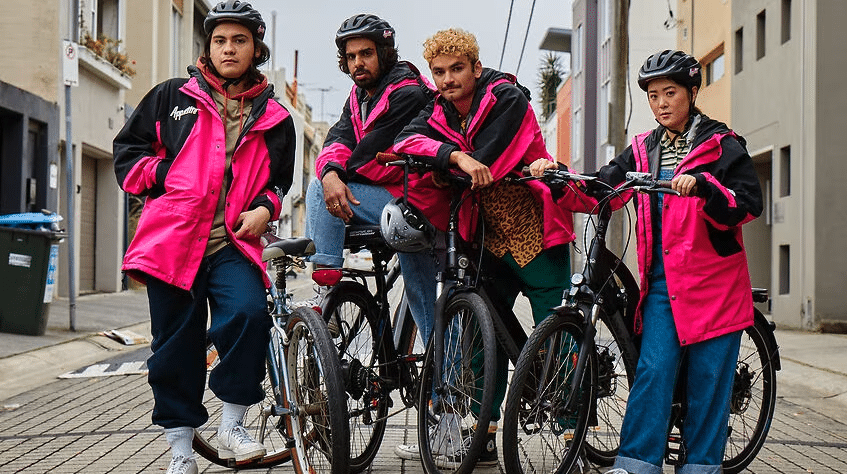You feel hungry, so you grab your phone and order from a food delivery app. The app pings you when your food’s arrived … but do you notice who brought you that paper bag, or are they just a blur in a branded jacket?
And when you see those same workers zipping through traffic on scooters or bikes, or waiting patiently outside restaurants with their padded cubes, do you wonder what their personal lives are like?
Appetite is a mystery series of six short episodes, set in Sydney among the food-rider community. An SBS Original billed as a dark hangout comedy/mystery, and citing inspirations including Search Party and Atlanta, it was recently the only Australian series invited to Canneseries 2023 to screen in competition.
Chinese-born architecture student Tessa Li (Shirong Wu) is floundering in Sydney, feeling both guilty and resentful as she dodges her self-sacrificing mum’s constant phone calls. If she doesn’t nail her upcoming model-presentation assignment, she’ll be put on academic probation. But not because, as her lecturer (Ana Maria Belo) patronisingly tells her, ‘international students can sometimes have a harder time adjusting …’
Tessa’s problems are more basic: she can’t earn enough from casual work to make rent in her new sharehouse, run by smarmy slacker Zal (Raj Labade). So she begs her cute housemate Raj (Kabir Singh, The Tourist) to get her a gig with Appetite, the food delivery app where he works, as does their Chilean housemate Bastian (Gabriel Alvarado).
But Tessa, Bastian and Zal soon learn that Raj – who’s anxiously awaiting the outcome of his permanent residency application – is way over his head inside the informal economy that whets Appetite.
Leaning more on narrative mystery than jokes, and boasting four strong, likeable central performances, Appetite is a snack rather than a meal. But it’s very moreish, and I felt disappointed when it was over.
Cartoonish or realistic?
Co-creators Mohini Herse and Neil Sharma had been developing Appetite since 2017, fascinated by the gig economy of food delivery apps; but they revisited it with fresh urgency when Covid lockdowns turned these precariously employed people into ‘essential workers’.
The script by Herse, Grace Tan and Neilesh Verma is based on interviews with food delivery workers; and it sharply observes the way they become interchangeable dots on a map the second they don the app’s livery. Even restaurant waitstaff yell at them: ‘Rider, go round the back!’
Read: What to watch in June: new to streaming, cinemas and film festivals near you
That a food delivery app would lure its couriers into dangerous, unethical practices while disavowing legal responsibility for workplace health and safety is at this stage more a matter for documentary than drama. Five food couriers died in traffic crashes in 2020, four of them in Sydney; yet their families have had to fight to access workers’ compensation payouts because the app companies argued they were contractors rather than employees.
(And in a regrettably metatextual moment last year that the Sydney Morning Herald was pleased to report, production company Fell Swoop Pictures briefly posted a call for extras to appear onscreen as Appetite couriers, with their own bikes, but be paid in free food, rather than Equity day rates.)
Appetite treads a tricky path between gritty naturalism and heightened comedy, and mostly plays it straight. Depicted in choppily edited sequences, the courier work is relentless, sometimes scary, and ridiculously low-paid for the kilometres travelled. The Appetite AI (voiced by Marta Dusseldorp) deluges Tessa with instructions on her phone, constantly nagging her that she’s running behind or missing out on bonuses.
But the app soon gets cartoonishly sinister; and here the sub-15-minute episode runtime lets the show down, because the mysteries it sets up are resolved too quickly and easily to be properly satisfying. I would happily watch an expanded version of this story that let its world-building breathe and its tension build.
Having said this, I really liked Fiona Donovan’s production design and Genevieve Graham’s costumes, which effectively bring out the dystopian side of the app’s Barbie-pink branding. The colour always draws the eye onscreen, whether on the rain jacket of a cyclist rushing through traffic, or the unearthly glow a smartphone screen casts in the dark.
Hangout-able characters
Appetite could’ve been a quirky workplace sitcom like Party Down, a more earnest share-house dramedy like Five Bedrooms, or one more self-conscious of representing diversity, like Why Are You Like This. But I enjoyed that it’s more low-key than any of these.
Australian screens don’t often focus on nonwhite people’s everyday lives without Making An Issue of it. Despite its tense, stressful moments, there’s something appealingly ordinary about this show. The sharehouse is properly shabby, not a cosy fantasia of indoor plants and fairy lights. But Raj will leave Tessa dinner in the fridge to heat up later. Bastian will pour late-night shots of pisco. A big night is pancakes from the hawker stall that does student discounts. And it’s a casually polyglot show, where using (and learning) languages other than English can mean defiance, comfort or friendship … and in the case of Tessa and Raj, perhaps something more?
Agreeably, Appetite is grounded in a solidarity springing from the characters’ shared migrant dislocation and economic exploitation. As a more familiar kind of silly TV twentysomething, Zal is the outlier; when the others realise he grew up rich in Sydney, it shocks them less than when they realise his mum’s white.
The four lead actors are all very charming – even Labade, who’s saddled with acting like a dickhead for the first half of the series. However, Wu is especially watchable as Tessa. I would happily follow them on more adventures – and surely there’s room to explore the delivery-rider subculture more deeply than the quick glimpses we get here.
But for now, Appetite will definitely hit the spot when you’ve got a spare hour on the couch.
All six episodes of Appetite are screening on SBS On Demand
Actors:
Director:
Format: Movie
Country:
Release:





